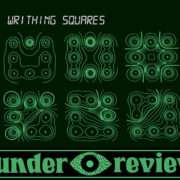Marlene Ribeiro 

On her first record under her own name Marlene Ribeiro steps away from the shadows of her work with Gnod and previous solo outings as Negra Branca. In fact, the works on Toquei no Sol transport the listener from their terra firma foundations altogether, invoking a kind of astral plane incubation. Ribeiro’s compositions let their intentions wander, anchored by rhythmic pulses but letting the rest of the album’s aural projections flicker with a dream-like looseness that drifts between obfuscation and lucidity. The record snakes through snatches of field recordings that capture the green dampness of leaves and dirt, audio of Ribeiro’s Portugese grandmother in her kitchen, scarred brass, sinister synths, hand drums, and her own hazed vocals.
Most records that self-apply the term dreampop merely mean that the keys and vocals have passed through a pink plume before hitting the tape, but here the term seems perfectly tailored to her approach. The record is delightfully untethered to order and logic. There are moments that feel akin to the late aughts penchant for noise pop blown through a fog of distorted reality — Pocahaunted and Topaz Rags come to mind most prominently. Here, though, Ribeiro has taken that aesthetic out of the lo-fi file folder and let it breathe in it’s own viscous, yet resplendent light. Toquei no Sol is disorienting yet soothing, familiar yet completely foreign. It’s a world that seems to only exist within these forty minutes, but thankfully you can always return once the needle’s pulled back to the beginning.
Support the artist. Buy it HERE.








